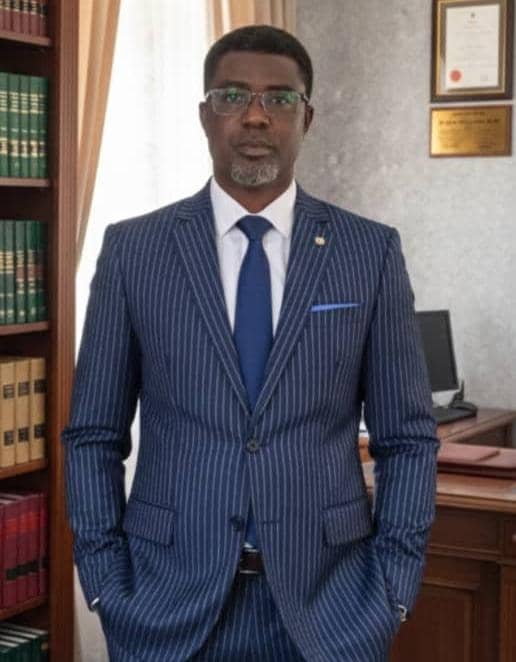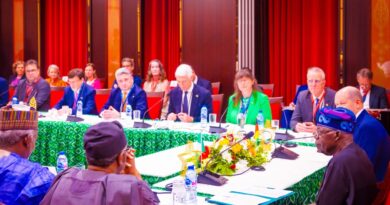Wike Vs Yerima: Setting A Dangerous Precedent Of Illegality Through Emotional Endorsement
The public space has been engaged with discourse and analysis on the recent engagement between the Honourable minister of FCT and a Naval officer in respect of a supposed unlawful possession and development of a piece of land in Abuja. While some ostensibly displayed utmost pleasure that the minister met his match, some out of moral assessment preached that the minister should have refrained from insulting a uniformed man. He was wearing a uniform that represents the country and by extension, the president. While these assumptions travel through the pipes of preoccupied standpoints, some legal minds have dealt extensively to best of individuals’ perspectives. Hence, this piece joins same efforts.

Facts: the available fact as advanced by the Minster via the Special Adviser on communication and Media (as picked from his Facebook account) is thus x-rayed.
The land in question was allocated to SANTOS ESTATE LIMITED in 2007, for PARK and RECREATION. In 2022, the company wrote to the then FCT Minister, seeking approval to change LAND USE PURPOSE to residential. While still waiting for response to this request, the company decided to partition the land and sell to people, including the former Chief of Naval Staff. The then FCT Minister declined the request to change the land use purpose from PARK and RECREATION to RESIDENTIAL. Meanwhile, Santos Estate Limited already sold the land to unsuspecting people, including the former CNS, who is building DUPLEXES on his own.
From the foregoing, the issues are stemmed thus.
i. That a land was allocated to a third party; SANTOS ESTATE LIMITED for the purpose of park and recreation activities whose application for change of purpose was not declined by Hon minister Wike’s predecessor.
ii. That the said SANTOS ESTATE LIMITED sold the land to members of the public; including former Chief of Naval Staff, Vice Admiral Awwal Gambo, in contravention of the terms and conditions of the allocation.
iii That the former Chief of Naval Staff, Vice Admiral Awwal Gambo is possession and developing a plot without allocation and in defiance of planning law. And had further stationed naval officers to deprive enforcement.
The fact that the purpose of the initial allocation was altered and there was not official approval by the appropriate authority to reflect the change rendered the land reversible to the government. More of concern is that the said portion of land was never intended to be sold for the residential purpose which is breach of sections 3, 7 of the provisions of the FEDERAL CAPITAL TERRITORY ACT 1976, section 3 creates the Federal Capital Development Authority with the among other functions “to prepare a master‐plan for the Capital city and of land use with respect to town and country planning within the rest of the Capital Territory”. While section 7(1) of the same Act specifically provides that “no person or body shall within the Federal Capital Territory carry out any development within the meaning of this Act unless the written approval of the Authority has been obtained by such person or body”. This position is also provided in section 28 of the Nigerian Urban and Regional Planning Act 1992. (1) Approval of the relevant Development Control Department shall be required for any land development.
It also expected that the ‘conditions for grant of development permit to conform with condition of issue of certificate of occupancy or a customary right of occupancy’ as stipulates in section 36 Nigerian Urban and Regional Planning Act.
Therefore, it is legal that such development must comply with the conditions attached the grant of the said portion as earlier allowed to the original grantee and noncompliance thereto renders the the allocation revocable.
The subsequent possession and development of the apportioned plot by the former Chief of Naval Staff, Vice Admiral Awwal Gambo is not only unlawful, illegal but criminal. The available remedy is for the the Executive Secretary or any other officer or servant of the Authority authorised in that behalf to have right of access at all times to any land or building within the Federal Capital Territory for the purpose of ascertaining that the provisions of this Act are not being contravened. See: Section 8(1) (a) of the FEDERAL CAPITAL TERRITORY ACT and sections 39, 47, 53, 54 and 60 NIGERIAN URBAN AND REGIONAL PLANNING ACT.
In the eye of the law and in absence of contradicting facts, the former Chief of Naval Staff, Vice Admiral Awwal Gambo illegally possessed the land and also criminally carrying out development on the said land without permit or approval. This necessitated the supercilious act of violently intimidating the authority officials who are meant to ensure compliance.
THE PROPRIETY AND OTHERWISE OF USING NAVAL OFFICER TO GUILD A PRIVATE PROPERTY.
Bringing the military into the civil or land related matter is unconstitutional. It is an aberration. It is a breach of national security and the threat thereon that must be taken seriously to curb attending propensity.
In the Notable judicial pronouncement, it was said:
“It is up to the police to protect our nascent democracy and not the military, otherwise the democracy might be wittingly or unwittingly militarised. This is not what the citizenry bargained for after wrestling power from the military in 1999. Conscious step or steps should be taken to civilianise the polity and thereby ensure survival and sustenance of democracy.” Per SALAMI, J.C.A. in Yusuf v. Obasanjo [2005] 18 NWLR.
This was the position of the court in response to the use and/or deployment of soldiers for the election and related activities. It is apparent threat and a recipe of anarchy when the military is dragged into civil matter. It is more condemnable that the motive was to prevent officials of government institution from carrying out lawful duties.
Section 217(2) of the 1999 constitution simply allows the use of armed forces to assist civil authorities in restoring order during insurrection when directed by the President and subject to set by National Assembly and not in the circumstance of using them for illegal duty. Apparently, the use of any member of the armed forces for the purposes of civil matter is not envisioned.
Section 4 of the Armed Forces Act provides that “Notwithstanding the generality of the provisions of subsection (3) of this section (a) the Navy shall, in particular, be further charged with:- (i). enforcing and assisting in co-ordinating the enforcement of all customs, laws, including anti-bunkering, fishery and immigration laws of Nigeria at sea; (ii) enforcing and assisting in co-ordinating the enforcement of national and international maritime laws ascribed or acceded to by Nigeria”. This is the fundamental purpose/function of a Naval Officer and what whatever order from any superior authority must be for the purpose of functioning as expected in sections 3 and 4 of the Armed Forces Act. And a slight departure from the said provisions renders any order, duty and/or activity amply illegal.
Nigerian courts have held any illegal or unlawful order by the superior officer to the junior officer to be worthy of no obedience and the consequence of same to be indictable. Most recently, the apex court case of Onunze vs. State (2023) 8 NWLR (Pt. 1885) 61 at 108 SC, held thus:
“My Lords, the obligation to obey the orders of a superior does not include orders that are palpably illegal or manifestly unjust. Every military or police officer swears an oath upon commissioning. The Oath is not to obey all orders, it is to “preserve”, “protect” and defend the Constitution of the Federal Republic of Nigeria against all enemies, foreign and domestic. When an officer obeys palpably illegal orders, they become personally liable for their actions and would be expected to face court martial or official sanction for the wrongdoing.”
The gist of the position is that no officer of the Armed Forces is obliged to obey or carry our any directive or order that manifestly unlawful and illegal. The Supreme Court in the case Nigerian Air Force v. Kamaldeen (SC) (2007) 7 NWLR (Pt. 1032) 164 made it clear that an order is not always to be obeyed if it is not within the law. For the order to be obeyed, it must be lawful as stated thus:
A soldier is responsible to military and civil law, and it is erroneous to suppose that a soldier could be protected when a superior order is grossly and manifestly illegal. Therefore, a soldier is only bound to obey lawful orders and is responsible if he obeys an order not strictly lawful. [Nwaoga v. State (1972) 1 All NLR (Pt.l) 149 referred to.] (P. 188, paras. F-G)
The same position was reached by the Court in the case of Nigeria Air Force vs. James (2002) 18 NWLR (Pt. 798) 295 in condemning the tendency of anarchy tied to the obedience of carrying out unlawful order.
Can the order purportedly obeyed by A.M. Yerima be deemed to be lawful? The answer is in the negative. Considering the fact that compliance to the said order was to breach the enforcement of a civil law on possession, ownership and development of a private property. The actions of A.M. Yerima is a clear breach of civil law and this is also punishable under the Armed Forces Act.
Section 114 of the Armed Forces Act provides that:
(1) A person subject to service law under this Act who commits any other civil offence, whether or not listed under this Act or committed in Nigeria or elsewhere, is guilty of an offence under this section. (2) For the purposes of subsection (1) of this section, “civil offence” means an act or omission punishable as an offence under the penal provisions of any law enacted in or applicable to Nigeria, and in this Act “corresponding civil offence” means the civil offence the commission of which constitutes the offence under this section.
In conclusion, military follows lawful orders from their superior. The order is lawful when is within the legally permissible frame. An order that manifestly offend the Armed Forces and Civil Laws are not to be obeyed. Intervening in civil property related activities absent a clear military nexus and same exceed reasonable military order. It is important to note that obedience to such unlawful order does not absolve personal responsibility for illegality where rule of law is expected to be prioritized over the cliché of order is order. In the case of Nigerian Army v. Yakubu (2013) 8 NWLR (SC) (Pt. 1355) 1 the Supreme Court affirmed that: “The law is not a respecter of persons or any corporate institution, or any organization who or which violates the provisions of the law…”
It worth mention however, that the Minister for the Federal Capital Territory is empower to enforce the law accordingly in this circumstance. Nonetheless that some are of the view that the minister possesses no such power. I am of a considered view that the law permits the Minister of the federal capital to enforce applicable law just like a State Governor. He possess such power (as delegated by the president) to the extent of enforcing all laws applicable in the federal capital Territory as set bellow in section 18 of the FEDERAL CAPITAL TERRITORY ACT:
Delegation of powers to the Minister for the Federal Capital Territory As from the 28th May, 1984, the President has delegated to the Minister of the Federal Capital Territory the following functions, that is to say‐ (a) any function or power conferred on the chairman of the Federal Capital Development Authority under this Act; (b) any executive power of the Federal Government vested in the President pursuant to section 299 (a) or any other section of the Constitution of the Federal Republic of Nigeria and exercisable within the Federal Capital Territory; (c) any function or power conferred by any law set out in the Second Schedule to this Act vested in the Governor or Military Governor of a State;
Thus, the provisions of section 18 of the FEDERAL CAPITAL TERRITORY ACT exactly endorsed his power to carry out his functions and powers as delegated by the President. Apparently, the Minister of the Federal capital weights the power of the president and obstructing his responsibility amount to obstructing the president of the Federal Republic of Nigeria.
Olu Akinkuowo Esq
Managing Partner
OLU AKINKUOWO LAW FIRM
Abuja,
oluakinkuowo@gmail.com




